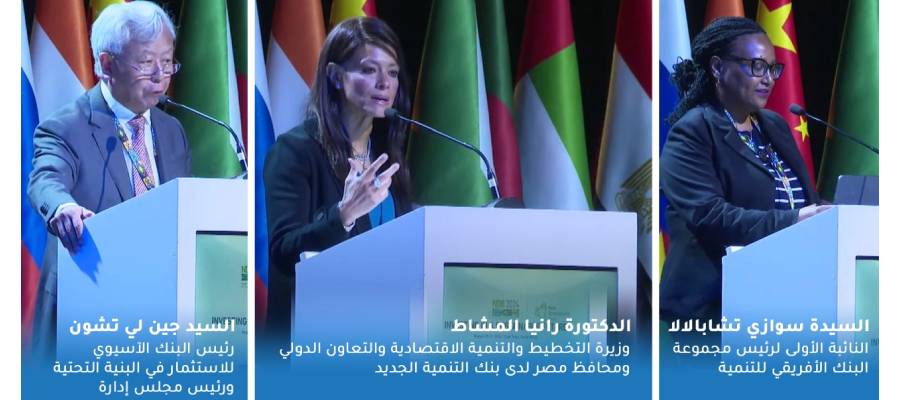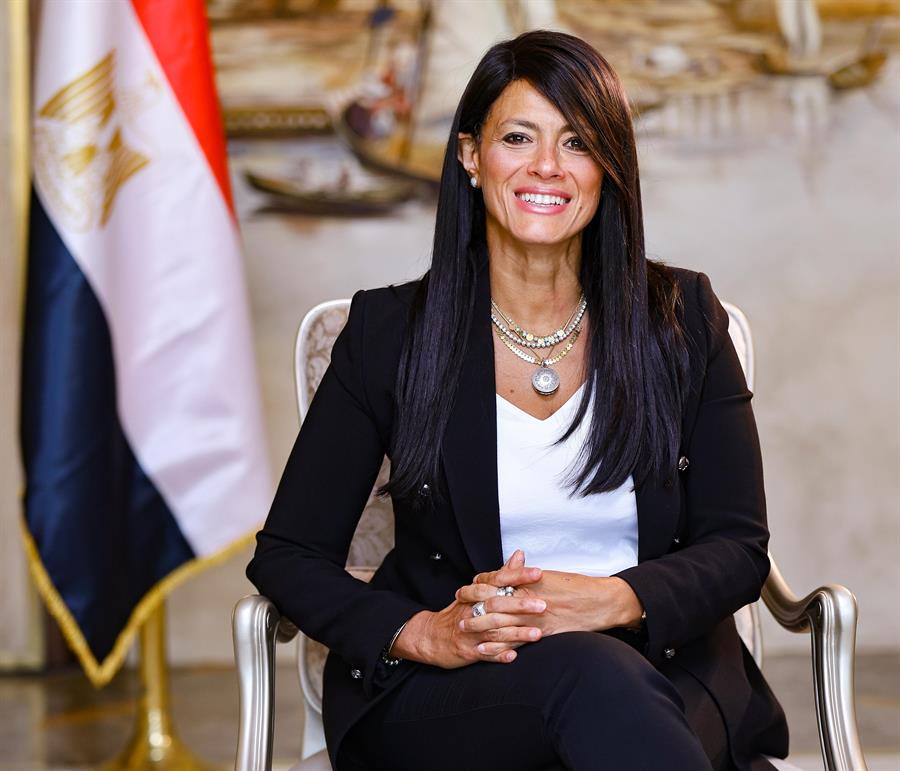The Minister of Planning, Economic Development and International Cooperation Participates “Development Finance Institutions at the Forefront of Infrastructure Investment” Panel Discussion

02 September 2024
H.E. Dr. Al-Mashat: “Investment in infrastructure to provide essential services to citizens is a cornerstone of economic development and achieving the SDGs”.
Emerging economies face development gaps that necessitate advancing developmental cooperation and concessional financing through international financial institutions
Expanding blended finance mechanisms and engaging the private sector are national and international priorities to close the infrastructure financing gap
We commend the collaboration between the New Development Bank, the Asian Infrastructure Investment Bank, and the African Development Bank in expanding innovative financing tools for member countries
President of the Asian Infrastructure Investment Bank: International financing institutions are called to rethink their financing methodologies and emphasize the need to reduce costs and burdens associated with obtaining finance
Senior Vice President of the African Development Bank stresses the importance of simplifying approval processes and timeframes for financing for governments and the private sector
During the annual meetings of the New
Development Bank (NDB) of the BRICS group in South Africa, H.E. Dr. Rania A. A.
Al-Mashat, Minister of Planning, Economic Development, and International
Cooperation and Egypt’s Governor at the New Development Bank, participated in a
panel discussion titled “Development Finance Institutions at the Forefront of
Infrastructure Investments.” The discussion was attended by Mr. Jin Liqun,
President of the Asian Infrastructure Investment Bank, and Ms. Swazi Tshabalala,
Senior Vice President of the African Development Bank Group, with Mr. Bin Han,
Director General of the Private Sector and Non-Sovereign Guaranteed
Transactions Department at NDB, serving as the moderator.
In her speech, Al-Mashat highlighted the significance
of the NDB’s annual meetings held in South Africa and the developmental model
implemented by the country. She noted that this reflects the considerable
diversity in development models applied by the bank’s member countries, which
is also evident in the NDB’s interactions with other multilateral development
banks to finance various projects.
H.E. Minister Al-Mashat emphasized the
importance of infrastructure in connecting markets, boosting economic growth,
and improving citizens' quality of life.
H.E. Dr. Al-Mashat explained that the
infrastructure needs in emerging markets and developing countries are immense,
requiring trillions of dollars annually to address these needs in various
sectors such as water, sanitation, renewable energy, and transportation. This
underscores how infrastructure development directly impacts the quality of life
of citizens and drives economic advancement.
H.E. Minister Al-Mashat also noted that as
infrastructure project demands increase, investment costs rise, with the
infrastructure financing gap in Africa alone estimated at around $100 billion.
Public resources are no longer sufficient, and in Sub-Saharan Africa,
infrastructure financing needs account for 7% of GDP, with higher percentages
in other regions.
H.E. Dr. Al-Mashat continued, "According
to the World Bank, low and middle-income countries need trillions of dollars to
bridge these gaps. We must also consider the technological gap, as the
inability of middle and low-income countries to keep pace with technological
progress leads to widening development financing gaps and limits their ability
to achieve desired progress." Additionally, the Minister addressed the
insufficiency of climate finance.
The Minister pointed out that while climate
change imposes harsh realities and unprecedented challenges, there is a
significant disparity in accessing finance, which multilateral development
banks are working to overcome and address, particularly in Africa.
H.E. Minister Al-Mashat stated that attracting
investment for climate projects requires substantial effort, involving
development banks, governments, the private sector, philanthropic
organizations, and other financing sources that can mitigate risks for the
private sector.
H.E. Dr. Al-Mashat explained that the shared
vision of the New Development Bank, the Asian Infrastructure Investment Bank,
and the African Development Bank can drive practical solutions for climate
finance and reduce project implementation costs through innovative financing
tools, thereby advancing from climate pledges to implementation. She also
discussed national efforts to enhance climate finance solutions, including
hosting COP27 and working with development partners to launch the "Sharm
El-Sheikh Guidebook for Just Financing," which aims to improve climate
finance both in quantity and quality and address gaps and disparities between
countries. This should be a focus for international institutions and
multilateral development banks to create a sustainable approach to climate
projects and provide more financing tools.
Moreover, the Minister emphasized the
importance of national ownership and clear strategies for implementing each
country's priorities, as well as the integration between climate and
development efforts.
Al-Mashat concluded by underscoring the
importance of leveraging the BRICS group and its New Development Bank to
enhance investment flows among member countries to meet the aspirations of
various nations. She also highlighted the increased cooperation and integration
among multilateral development banks, which was not previously observed.
H.E. Minister Al-Mashat added, "We, as
countries, must also play our part in advancing this cooperation by presenting
transparent and clear investment projects capable of attracting blended finance
and private investments."
The President of the Asian Infrastructure
Investment Bank stated that investments in sustainable infrastructure are
essential for achieving inclusive and resilient growth and meeting global
climate goals. He noted that, given the increasing gap in infrastructure
financing, development finance institutions need to rethink their approaches to
rapidly expand infrastructure financing in developing economies, provide
finance swiftly, and mobilize the necessary technical and financial resources
for efficient project implementation. He also addressed the importance of
cooperation among multilateral development banks through co-financing and the
need to reduce transaction costs.
Meanwhile, the Senior Vice President of the
African Development Bank highlighted that without expanding infrastructure
projects, achieving sustainable development in Africa and the African Union
Agenda 2063 would be extremely challenging. She noted that the bank recognizes
that addressing the infrastructure gap in Africa requires partnership and
cooperation. She emphasized that accelerating infrastructure development will
not occur without reconsidering the complex approval processes within
international financing institutions and development banks, stressing the need
to simplify and reduce approval times to enhance benefits for government and
private sector clients.









